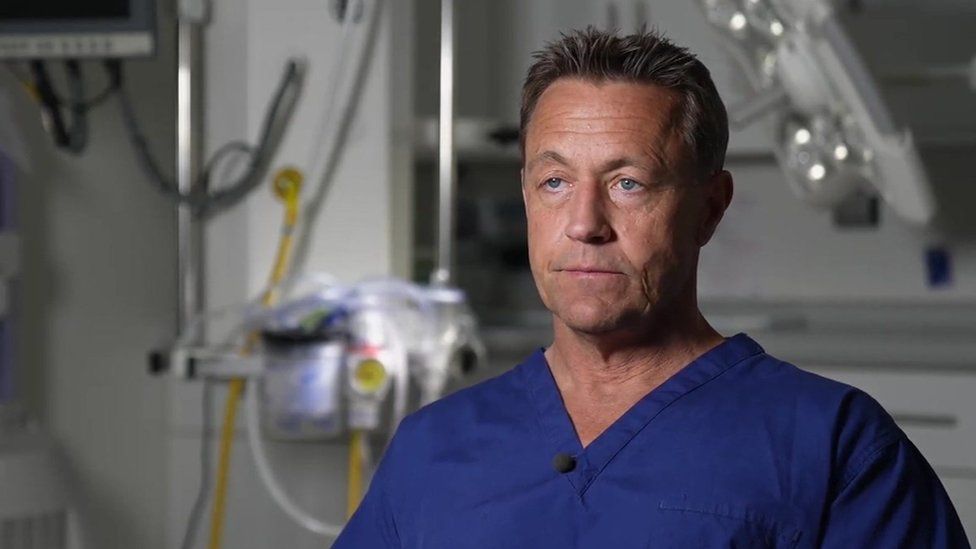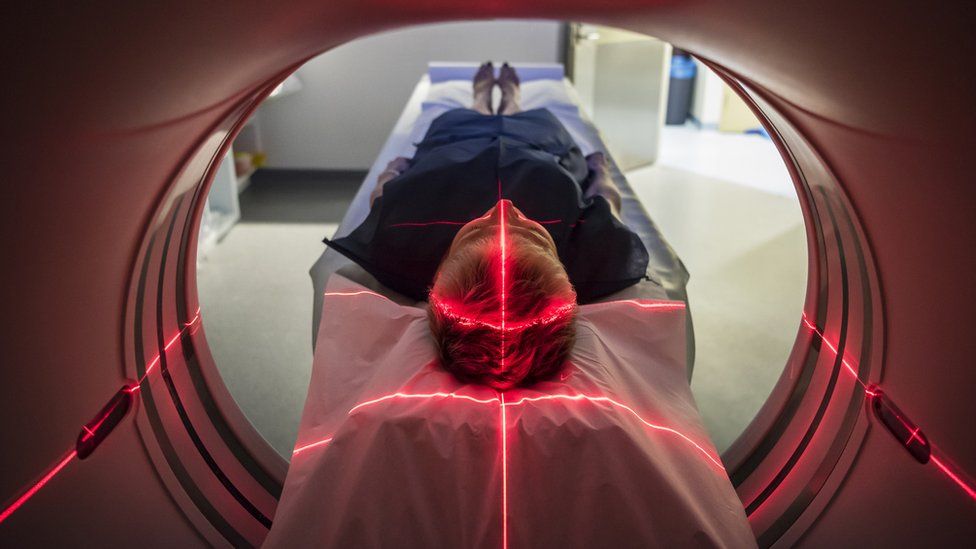 Getty Images
Getty ImagesThe number of people waiting longer than two years for routine operations in England has fallen from 22,500 at the start of the year, to fewer than 200, according to NHS figures.
This excludes more than 2,500 who are complex cases or chose not to travel for speedier treatment.
NHS England said it had achieved the first milestone in its plan to eliminate backlogs caused by Covid.
A record 6.6 million people are still waiting for hospital treatment.
Most have been waiting up to 18 weeks for routine operations, including knee and hip replacements, and eye surgery, with about 300,000 on a waiting list for more than a year.
Eliminating 18-month waits by April 2023 is next on the government's agenda.
The numbers of people waiting a long time for routine hospital treatment have soared during the past two years throughout the UK, as operations were cancelled to free up beds for Covid patients.
The situation pushed people into borrowing thousands of pounds for private treatment.
To reduce the backlog, patients have been offered travel and accommodation costs to be treated in an alternative part of the country.
In England, large numbers have been sent to private hospitals for surgical procedures, while community diagnostic centres have been set up to deliver thousands of checks and scans.
NHS England promised to "virtually eradicate" the list of people waiting more than two years for treatment, by the end of July.
It has now shrunk to 168 patients, who mostly live in the South West - the area worst affected by Covid staff absences and pressure on the health service.

Sulis Hospital Bath has been treating patients from seven local hospitals in the region - more than 1,100 extra patients since September.
Extended theatre times, an operating theatre on the back of a lorry and close relationships with the local trust have all helped to increase the numbers.
And the private hospital, now owned by a local NHS trust, plans to take a growing number, from greater distances, for a wide variety of orthopaedic surgery and eye procedures.
"It's been a lot of hard work," clinical director and consultant Gavin Jennings said.
Waiting longer
The Omicron Covid variant, first identified in South Africa, had hit the hospital quite hard, he said, affecting staffing levels and causing operations to be cancelled.
"As a result of people waiting longer than usual, some of those cases are now more complex and symptoms may have become worse," Mr Jennings said.
"That's why there's a need to recover from Covid quickly."
In addition to the 22,500 people waiting two years or more at the start of the year, a further 43,500 who would have waited more than two years by the end of July had also been treated, NHS England said.

NHS England chief executive Amanda Pritchard said the health service had continued to reform the way it delivered care, "using innovate techniques and adopting pioneering technology, like robot surgery".
But there are now warnings of high demand on other services.
Saffron Cordery, the interim chief executive of NHS Providers which represents hospital trusts, told the BBC: "There is a long way to go with mental health, community and hospital care backlogs, and to relieve pressure on ambulance services."
Cutting cancer diagnosis waiting times and eliminating 78-week waits was now a priority, she said, adding that progress could be "put at risk" if the government did not increase investment in the NHS.
Regarding potential strikes by nurses over pay, Ms Cordery said: "Nobody wants to see industrial action, but what we have to remember is that we have a workforce that has been working flat-out for the past two-and-a-half years, and is now being asked to go the extra mile again to get these waiting lists down."
Health and Social Care Secretary Steve Barclay said: "We are working hard with the NHS to get our health system back to peak performance, by growing the healthcare workforce, opening new community diagnostic centres and surgical hubs across the country, and investing in innovative technology to ensure patients can access the treatment they need while saving staff time."
In Wales, the number of patients waiting the longest has been reducing for the past two months, due to more staff and equipment and new facilities, the Welsh government said.
In Scotland, more than 10,000 people were waiting more than two years in June, compared with 648 the year before.


Have you waited two years for an operation that you have recently had? Tell us your story by emailing: haveyoursay@bbc.co.uk.
Please include a contact number if you are willing to speak to a BBC journalist. You can also get in touch in the following ways:
- WhatsApp: +44 7756 165803
- Tweet: @BBC_HaveYourSay
- Or fill out the form below
- Please read our terms & conditions and privacy policy
If you are reading this page and can't see the form you will need to visit the mobile version of the BBC website to submit your question or comment or you can email us at HaveYourSay@bbc.co.uk. Please include your name, age and location with any submission.
https://news.google.com/__i/rss/rd/articles/CBMiKmh0dHBzOi8vd3d3LmJiYy5jby51ay9uZXdzL2hlYWx0aC02MjQ2NTYyNtIBLmh0dHBzOi8vd3d3LmJiYy5jby51ay9uZXdzL2hlYWx0aC02MjQ2NTYyNi5hbXA?oc=5
2022-08-09 06:48:46Z
1523909990
Tidak ada komentar:
Posting Komentar